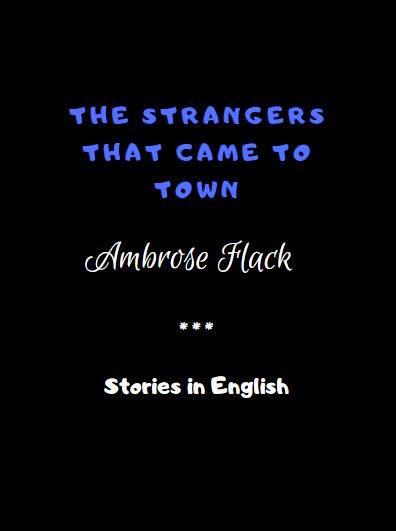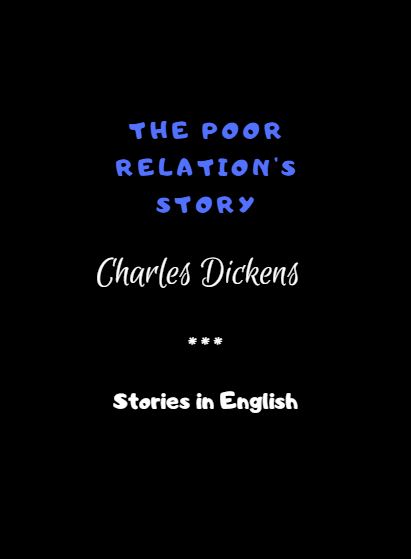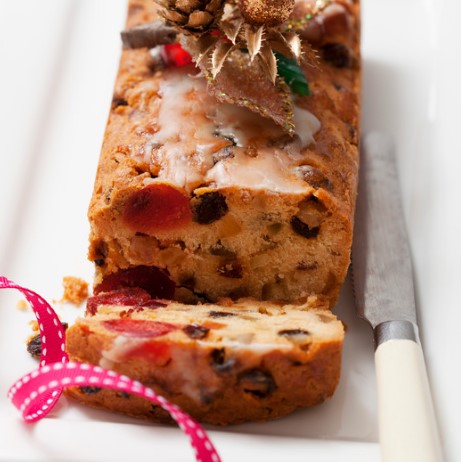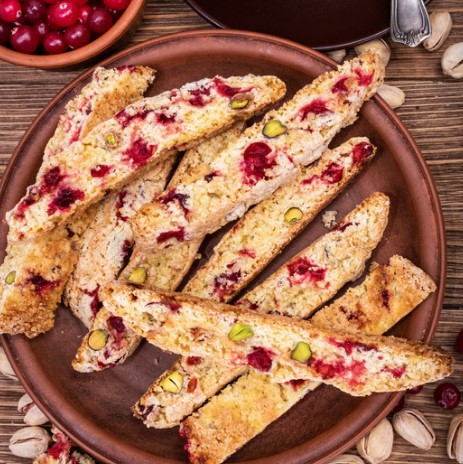
Recursos Educativos en Inglés - Stories in English
Cuentos clásicos en inglés
The Strangers That Came to Town - Ambrose Flack
The first of April came dark and stormy, with silver whips of lightning cracking open the lowering clouds that seemed to skim the treetops. My brother Tom and I, recovering from chest colds, tired of reading and listening to the radio, turned to the big living-room window of our house on Syringa Street.
"Here they come, Mother," cried Tom when a big truck drove up in the teeming rain and stopped in front of the empty cottage across the street. Mother hurried in from the kitchen and we three looked out. That truck, we knew, contained the Duvitch family and all their earthly possessions. Mr. Duvitch and the biggest boy carefully helped Mrs. Duvitch from the seat and walked her into the house, supporting her all the way. Another big boy, carrying a well-bundled baby, followed. A stream of young Duvitches, accompanied by a big brown houndlike dog, poured out of the back of the truck and stood in a huddle in the rain.
The barnyard sounds we heard escaped from two crates of hens the Duvitches had fetched along and from a burlap bag in which a small flock of ducks had been stowed. While the livestock made noises according to its kind, the Duvitches were quiet--almost solemn. They showed no elation at finding themselves in a new neighborhood and a very pretty neighborhood at that.
All afternoon Mother, Tom and myself had been watching out for them, with rather mixed emotions. For the Duvitches were immigrants and the first of their nationality to settle in our small smug town. Coming to our obscure part of the state a year before, they had moved into a rotting old farmhouse two miles north of town, long abandoned. After the slashing hurricane of mid-March, the moss-rotten dwelling looked like the house in the fairy tale that remained standing only because it did not know which way to fall and the Duvitches were forced to give it up.
"I wonder if Mrs. Duvitch is ill," murmured Mother, looking through the rain at the dreary street scene.
"She must be," said Tom. "I wonder if it'll be all right for Andy and me to help 'em move in their stuff."
This request, as Mother well knew, was not inspired by genuine feeling for the Duvitches but by curiosity and she shook her head. It was a strict family rule that any illness which kept us out of school would automatically keep us indoors.
But the Duvitches got along very well without help from us. As it turned out, they were old hands at moving. For years before coming to America they had been on the move, to escape starvation, separation, possible assassination. Every child capable of two-legged locomotion pitched in and helped carry the things from the truck. In no time at all, it seemed, the truck was empty and the Duvitches were shut up tight in their new home.
That was the signal for Mother to step into the kitchen. She returned swathed in her hooded raincoat, carrying a basket containing a vacuum jug of chicken soup, a baked tuna fish dish, steaming hot; a loaf of fresh bread and a chocolate cake. These she took to the house across the street and gave basket and all to the boy who answered her knock. It wasn't her plan to stop for a visit that day but to wait a week or so and call when the Duvitches were all settled.
The next day when the three of us--Mother, Tom and myself--were having lunch, we heard a faint tap at the back door. I answered it and there stood a pale dark-eyed boy, looking very solemn, holding our basket. It contained the empty vacuum jug, casserole dish and cake plate, all of which shone, and a tiny very shapely potted rose tree, in exquisite pink-tipped bud, the handsomest plant--and the only plant of its kind--ever seen in that neighborhood.
"I send them a few scraps of food," murmured Mother, a few seconds later, deeply touched, "and get this queenly gift!"
That was our last traffic with the Duvitch family for over two years. When Mother stopped to visit them a week after their coming, the little girl who opened the door a few inches said, "Mamma sick; she stay in bed today."
Mrs. Duvitch never crossed the street to our house and Mother, a rather formal woman, made no further attempts to see the family. But Father disagreed when she remarked that she thought the Duvitches probably wished to be left alone.
Syringa Street seemed to be a friendly street. It was a crooked maple-shady country lane that wound through the town without losing its charm. The sidewalk here and there was almost lost in weeds and the ditches, in places, were brightened by clumps of orange day lilies. Widely spaced cottages, some of them smothered in vines, only seemed to make the neighborhood more rural. There were brilliant flower gardens, vegetable plots, fruit trees--and a few henhouses.
The children, who enjoyed all the benefits of country life while actually living in town, were quite numerous. Behind the facades of the street's dwellings there was probably no more greed, envy, superstition or intolerance than lurked behind the doors of any average dwelling in any average American town. The cardinal virtues, no doubt, were all represented. Yes, Syringa Street seemed to be a friendly street.
But the Duvitches were marked people. They were the one struggling family in a prosperous community--and poverty, amid prosperity, is often embarrassing and irritating to the prosperous. They were considered unattractive physically. They were so meek! The Duvitches never fought back.
The women started in on Mrs. Duvitch because she "never showed her face." It is true, she was rarely if ever seen in the daytime, emerging from her dwelling only after dark in warm weather, to sit on the veranda, where she found privacy behind the ragged trumpet creeper. But this gave rise to the rumor that she was the victim of an obscure skin disease and that every morning she shook scales out of the bed sheet. (When my father heard that one, he went out to the pantry and mixed himself a tall drink.)
Mr. Duvitch, too, was classified as an untouchable. His job, a rather malodorous one, was with the local rendering plant as a laborer. It followed that the Syringa Street young, meeting him on the street, sometimes stopped their noses as they passed him by--a form of torment all the more acute when Mr. Duvitch had to share it with the children that happened to be with him.
Black hard luck seemed to be their lot. A few weeks after they moved to Syringa Street they suffered a tragedy they were all summer in recovering from--Mr. Duvitch lost two weeks' pay while gathering mushrooms in Tamarack Swamp. Inside of a year and a half, three Duvitch boys had lost, among them, by various mishaps, two fingers, one eye and an ear lobe. They were forever being cut up, bruised, mutilated by things falling, breaking, cracking and exploding.
A mild case of typhoid, mass cases of whooping cough and measles--all plagued the family within a year of their arrival. Their only bright spot here was Dr. Switzer, one of the town's kindliest souls. He declined to accept fees, but was several times seen leaving the Duvitch cottage, carrying off a handsome house plant and looking very pleased. The Duvitches' dog, Kasimar, acted just like the family to which he belonged--like one of the world's poorest canine relations. He seemed to be afraid of his own shadow and no one had ever heard him bark or growl.
Because they cast their eyes on the sidewalk as one passed them by and spoke only when spoken to, the young Duvitches, like their parents, were considered antisocial. They were regarded as born scavengers too, for they spent hours foraging in the town dump, where they often picked up their footgear, some of their pants and shirts and furnishings for the house as well. They went on country excursions to gather watercress, dandelion greens, mushrooms and wild berries; and the few apples and tomatoes they occasionally concealed under their blouses didn't make the farmers on whom they poached much poorer.
Tom and I raided tomato patches and robbed apple trees just for the fun of it. That first September four Duvitches--Irving, Benny, Abe and Esther--registered at the local grammar school. Mrs. Lovejoy, the principal, said they were bright, conscientious, pathetically eager but almost pathologically shy. Before she could put a stop to it, some of their classmates scoffed at the leaf, lard and black bread sandwiches they ate for lunch, huddled in one corner of the recreation room, dressed in their boiled-out ragpickers' clothes. After school they headed straight for home, never lingering on the playground.
Even the tradesmen to whom the Duvitches gave good money were either curt with them or downright rude. Mrs. Frithjof Kinsella, the proprietor of the general store and a big jolly Viking who could be heard two blocks away, extended credit to almost everybody in town and had a way of insulting her customers so heartily that they all loved her for it. The Duvitches, however, Mrs. Kinsella very carefully did not insult (a form of insult in itself) and neither did she extend them credit.
But Mother, remembering the potted rose tree, always had a friendly word and a smile for the young Duvitches when she saw them and a bone for Kasimar when he found courage to venture across the road. Father was the only man on Syringa Street who tipped his hat to sixteen-year-old Maria Duvitch, when he met her coming home from her piece-work job in Miller's Box Factory. It may have been that their European travail made it easy for them to endure such a trifle as humiliation in America.
"I think," said Father one fine Saturday morning in July two years after the Duvitches had come to Syringa Street, "that it would be very pleasant for Andy, Tom and myself to pitch our tent out at Durston's Pond and spend the night. We could fish and swim. That is," he added, "if Mother can spare us."
"I can spare you very well," Mother said cheerfully. She had a notion it did menfolk good to get away occasionally and in this instance the sacrifice came easily, because camp life was little to her liking.
She packed a hamper of food, Tom and I fetched a tent from the attic and Father looked over his fishing tackle. An hour after lunch we were driving through rolling farm country out to Durston's Pond, four miles north of town.
We often had the serene little lake all to ourselves but on our arrival that afternoon we found half a dozen male Duvitches in possession. They had been fishing for several hours, casting from the shore, dropping their lines over the wooden bridge that spanned Cat Creek where it flowed into the pond and trolling for bass from a flat-bottomed rowboat.
Tom and I, Philistines like our friends, ignored the Duvitch boys but Father went up to Mr. Duvitch, who was fishing from the shore, and put out his hand.
"Good afternoon, Mr. Duvitch! It's nice to see you and the boys here. What a beautiful day! Are Mrs. Duvitch and the girls all well?"
Mr. Duvitch was a little fellow, a lean starveling of a man with watery blue eyes and a kicked-about look. Gratitude for being agreeably noticed showed in his mosquito-bitten face as he took Father's hand and his tremulous smile showed broken teeth.
"I know the mosquitoes are biting," Father went on pleasantly, "but are the fish?"
Proudly, oh, so proudly, Mr. Duvitch exhibited the catch that would probably feed his family for the better part of a week: a fine mess of bass, perch and sunfish, all of them alive, as far as I could see, and swimming around in the oaken washtub in which they had been dropped. Father gave Mr. Duvitch hearty congratulations and said we couldn't hope to do as well but that we'd try.
We three pitched the tent on a little knoll over the pond, and then Father, with a happy sigh, lay down on the blanket for a nap in the sun. Tom and I played a game of chew-the-peg on the grassy bank above the water and, later on, made several trips to the tent, for the camera, the field glasses, the sun lotion.
On a trip for a cold drink from the vacuum jug and to fetch towels and soap, we stopped to look again at the Duvitches' catch of fish.
Mr. Duvitch and the boys had moved away and were fishing in a small arm of the pond below us. None of them seemed visible. Tom and I, our glances meeting over the big cake of soap in my hand, were similarly and wickedly inspired--the thing was irresistible. We held a brief whispering conversation; and then, egged on by him and quite willing on my own, I played a shameful trick on the Duvitches, the memory of which will come back to the end of my days to plague me. Without considering further, I dropped the cake of soap into the tub of fish.
"Let's go," whispered Tom after we had watched the soap sink to the bottom.
We swam out to the raft, diving and frolicking in the deep water. After a while the Duvitches, calling it a day, assembled at a spot on the shore below our tent, happy in the knowledge of a good catch to take home.
In a little while Tom and I could hear their muffled exclamations of disbelief and dismay. Father woke up and joined our neighbors in a conclave, looking down at the tub of fish near his feet. After a few moments he produced the whistle he carried on all our country excursions and blew it piercingly three times, the proclamation of emergency. This meant that Tom and I must come at once.
Looking as guilty as we felt, we swam in and joined the group gathering around the tub. In the midst of our stricken neighbors stood Father, holding the half-melted cake of soap in his palm silently but accusingly, for the fish had perished miserably in the soapy water and were unfit to eat. Not only had Tom and I snatched precious food from their mouths but we had brazenly advertised the contempt in which we held them.
Father's eyes were narrow slits of blue fire in his white face. I had never seen him so angry. One look at Tom and me told him everything. Words would have been superfluous and my brother and I bowed our heads in acknowledgment of our guilt.
"You will begin," Father said in a voice I didn't recognize, "by saying you're sorry."
Our stunned neighbor wiped his blinking eyes as he listened to our mumbled words, which Father made us repeat when they were inaudible. But there was no hostility, no animosity toward us in the man and it was obvious also that he considered himself too humble to receive an apology, finding it, like most of life's troubles, a mockery to be endured without protest. His sons showed no resentment, either, only a kind of resignation in their minds, which carried almost atavistic memories of century-old oppression by country barons and landed gentry.
One-eyed Manny Duvitch, as it turned out, had told Father he had seen me drop something in the tub of fish (before he learned that it had been a cake of soap). Now he looked guiltier than Tom and I. Because he had been the witness and accuser, it was as if he considered himself to be the troublemaker, deserving the punishment. The two real culprits were the young lords of the ruling manor, with unlimited license, exempt from chastisement. To Manny, the fortunate, the well-to-do, were also the privileged.
"Do you realize," said Father coldly, looking from Tom to me, "that in certain primitive communities the sort of stunt you've pulled would be punishable by death?"
Tom and I did not reply.
"Turn over the tub," said Father abruptly, addressing us as if we were strangers.
We turned it over. The gray soapy water ran away in bubbly rivulets, disappearing in the coarse mat of turf, and the poisoned fish lay exposed on the grass--quiet, strangled, open-mouthed--and somehow looking as if they were mutely protesting their horrid unnatural fate.
"Count the fish," Father ordered us, his voice like steel.
Tom and I got down on our knees.
"How many are there?" demanded Father.
"Sixty-one," I said.
"How many bass?"
"Twelve."
Father handed Mr. Duvitch two dollars, the price of a day's rental of the r owboat. Then, looking both the avenging angel and executioner, he ordered Tom and me, with our tackle and bait, off the land we had disgraced--into exile, out on Durston's Pond.
"And you are not to come back," he gave out in the same steely tones, "until you've caught sixty-one fish to repay Mr. Duvitch. See to it that among them you bring in at least a dozen bass."
Father stepped up to the tent on the knoll to fetch our shirts and dungarees. These he rolled into a tight ball and shot like a bolt into the rowboat. He then turned his back to us and, thus disowned, Tom and I lost no time in rowing out on the pond. Father's decisions, even with Mother present, were never reversed and swift execution, from which there was no appeal, followed his sentences.
Out in the middle of the big pond we dropped anchor, threaded our steel rods and, baiting our hooks, began to fish. I knew that if it took us all summer to catch them, we dared not set foot ashore without sixty-one fish. Almost at once Tom pulled in a good- sized bass and ten minutes later two yellow perch were added to our string. The crestfallen Duvitches went home. Father threw himself on the blanket, furiously smoking a cigar. That was about four in the afternoon.
Oh, the mosquitoes! They were bad enough at the time, and while the light held, but after we had been fishing for three hours and had caught eight fish, they swarmed out of the swampland surrounding the pond in legions. After an hour of it we wanted to leap overboard. They got in our ears, our noses, our eyes, even in our mouths, and nestling in our hair, they bit through to our scalps. I remembered tales of Indian prisoners in Alaska, turned loose on the tundra by their captors, where they died of the mosquitoes in two hours. Several times we slipped over the side of the boat, immersing ourselves in the water to escape the bloodthirsty clouds.
The night dragged on while the whining swarms grew thicker.
"Andy, what time is it?"
"Ten o'clock, Tom."
"Is that all?" Tom groaned and pulled in another bass and killed six or eight mosquitoes in one slap. Two hours passed and midnight was ghostly on Durston's Pond. The moon, bright as day, sailed high in the purple sky, dimming the starfire, casting a great white shaft of quivering radiance on the water, but it was all hideous. The big yellow disk sank in a gauzy cloudbank, then disappeared for good and the stars shone out with renewed splendor.
"Andy, what time is it?"
"Two o'clock, Tom."
The treetops whispered as if in conspiracy against us. Owls hooted--mockingly we thought--and bats circled over our heads, making us feel thoroughly alone. Our only solace was the campfire Father kept burning near the tent, which flared like a beacon of light in the dark. We went on fishing as our tormentors bit and sang. Each hour was an eternity of frenzy and I fairly panted for the light of dawn to come, but even now I cannot decide which was worse, that night with the mosquitoes on Durston's Pond or the following day in the blistering heat.
"Andy--"
"It's four o'clock, Tom, and we've got sixteen fish."
Dawn came but even I, a highly impressionable youngster of seventeen, did not enjoy that calm effulgent majesty of daybreak. A long stretch on Durston's Pond, under the July sun, still faced us.
The rising sun was red, casting glimmering circles of rose-colored light on the windless surface of the pond. The mosquitoes thinned, the fish continued to bite. But as we fished the sun mounted steadily and by eleven it had fulfilled its awful prophecy and became a ball of fire in the cloudless skies. Tom and I began to bake in the heat waves that shimmered over the pond and we were steamed in the scalding vapory mist.
"I wish it was night again, Andy," groaned Tom after sweating out two hours of it. "This is worse than the mosquitoes."
"At least we won't get any infections from our bites, Tom," I said feebly. "The sun's cauterizing them."
"We might get sunstrokes, though. We're liable to, without our hats. But I don't care if I do. I'd rather be unconscious."
Tom was only fifteen and I think he hated me that day. I, the older, should have been his protector against participation in crime, not his accomplice. I wanted to row him in, then come back to finish the business alone, but there on the green Eden-like shore stood Father, stationed there barring the way.
Tom and I weighed our hooks down to the deep cold water. We caught two more bass and half a dozen sunfish.
By one o'clock groups of people gathered on the shore, for word of the drama that was being enacted on Durston's Pond had spread through the town. Some of the visitors praised Father for his stern discipline; others berated him. He went right on reading his magazine and smoking his cigar, as indifferent to their praise as he was to their criticism.
Local fishermen who knew the lake and something about the angling ability of the average youngster made gloomy estimates as to the possible length of our exile on the water. A few had us fishing until the snow flew. They made bets too. Would Tom and I have the guts to stick it out? Most of the bets were against us.
But we sat there in the rowboat, without food, through the hottest day of the summer.
No breeze stirred. No cloud obscured the sun. Even the bird life of the swamp, usually a medley of song, was silent and dead. Tom was drooping visibly in the glare and I tried hard not to look at his scorched face.
Between three and four we dropped lines in a school of yellow perch and pulled up no less than twenty. The bass continued to bite in the deep black holes off the swamp, which bristled with tree trunks. Benumbed, half-blinded, moving like automatons, Tom and I geared ourselves for the home stretch.
When the sun, dropping low, had lost its fury and the hard blue enamel of the sky began to pale, I pulled up the thirteenth bass, which was our sixty first fish.
Turned lobster-red, fairly devoured, famished and drooping from lack of sleep, we put together our rods and with our remaining strength rowed to where Father was waiting. He received us coolly, making no comment on our condition. At once he asked to see the fish and we held them up by the strings.
"Count them," he said. Obviously we would receive permission to land only when we had produced the required number, which was the price of our freedom.
"Sixty-one," said Tom.
"Including thirteen bass," I added.
"Very good," said Father in businesslike tones. "We will now restore to Mr. Duvitch his rightful property."
Tom and I took care not to play the part of triumphant heroes, even of redeemed sinners--that would not have suited our parent. Certainly, in appearance, we were more condemned than redeemed. But when we tottered out of the rowboat something in me was quietly rejoicing. I guessed that Father was secretly proud of our fortitude and I realized, too, that all through the night he had suffered with us.
We walked through the crowd of visitors on the lake shore, climbed into the car and silently drove to the Duvitch cottage. Mrs. Duvitch and the children were not visible but we found Mr. Duvitch sitting on the porch.
When he saw Tom and me and we silently handed him the strings of fish, he gulped and swallowed hard. For a moment he could not speak. Then, in a voice that was raw with emotion, he protested that he had not wished us to suffer so. Suppose we had fallen overboard in the dark?
"Will you shake hands with the boys?" asked Father.
Instead, Mr. Duvitch broke down. My brother and I did not know where to look and during those moments we suffered more acutely than we had suffered in the clouds of mosquitoes and under the broiling sun. After our neighbor had composed himself, he seized our hands and bowed his head over them. There was something Biblical in the man's gesture. Anyway, it was my greatest lesson in humility.
When Mother, who had heard about our exile on the pond from a neighbor, saw us she burst into tears. She tried to embrace us but we drew back painfully. While she was rubbing salves and ointments on our seared backs and necks, somebody knocked at the kitchen door and Father opened it to find Mrs. Duvitch standing there--the first time she had crossed the street to our house.
In her pale swaying hand Mrs. Duvitch held a porcelain teacup, ornamented with pink rosebuds and golden leaves--a relic from the old country and, as it turned out, her most cherished possession.
Her voice, thin and wispy from fright and shock, was difficult to follow. But we gathered that she had brought the teacup over as a peace offering and as a plea for our forgiveness to her family for the living purgatory, no matter whose fault, through which my brother and I had passed.
When Mother declined the teacup and assured Mrs. Duvitch that she would not have it otherwise with Tom and me, our neighbor, unable to find her tongue, made a little eloquent sign with her hands that was for thanks and that looked like a silent blessing. She quietly turned and went away; and again I felt that I had witnessed a profound moment.
Mother continued her ministrations to Tom and me and put us to bed. Despite our skin, which stuck to sheet and pillowcase, we slept like creatures drugged.
"It is high time," Tom and I heard Father say calmly, sanely, to Mother around noon next day when we woke up, "for this senseless feeling against the Duvitches to stop and I'm willing to do still more to stop it. Tonight we are having supper with them. I've just seen Mr. Duvitch and he remarked that since Andy and Tom caught the fish, he'd feel better if we all shared in them. I suggested a fish-fry picnic supper and with a few hints from me, and some encouragement, he invited us over. It may be an ordeal but we ought to be able to bear it."
We walked across the street at six o'clock, not knowing what to expect. All the Duvitches, dressed in their Sunday best, bright and flushed and shining as we had never seen them, received us at the door as if we had been royalty. They looked at Tom and me and delicately looked away--I shuddered when I thought of what my brother and I would have had to endure had this been any other family.
Instead of a wretched abode we found a scantily furnished home that shone with cleanliness and smelled of spicy garden pinks. In its almost barren simplicity there was something comely. A few of the stands, chairs and tables had the intimate quality of what is fashioned by the human hand. These, together with odds and ends the family had brought from the old country and others resurrected from the town dump and mended, painted, waxed and polished, made for a kind of native household harmony.
The house plants (no window was without several) delighted Mother. Mrs. Duvitch was raising little orange and lemon trees from seed and experimenting with a pineapple plant growing in a butter tub.
At once we were conscious of a remarkable difference in the demeanor of the family. The children, thrilled by their first party, by the family's first recognition in this country, kept showing their pleasure in wide delighted smiles. I couldn't believe they were the same timid downcast youngsters one met on the street and saw in school; they seemed to have been touched by a wand. The Duvitches' home was their castle: sustained and animated by the security of its four walls, shut away from a world of contempt and hostility, they were complete human beings. In their own house their true personalities emerged.
As the host Mr. Duvitch was a man we were seeing for the first time. Overjoyed to have neighbors in his house, he was so full of himself that I was conscious of an invisible stature in him which made him seem quite as tall as Father. He beamed and feasted his eyes on us. Saying very little, he managed to make us feel a great deal and he constantly sought his wife's eyes with glances of delight over the wonder of what was happening.
David, the oldest boy, helped his father serve a bottle of homemade blackberry wine. We ate fried fish and good food of the American picnic variety at a long plank table set out in the back yard under an apple tree. The young Duvitches passed things politely, never helping themselves first, and their thanks upon receiving a dish were almost ceremonial. They waited patiently for their plates and ate every scrap of food.
Father kept the conversation going. His every word was listened to, every childish eye riveted on him while he spoke.
Tom and I, fascinated by the family's metamorphosis, almost forgot about our blisters and our stings. As father told stories and jokes, we discovered that the Duvitches had a gift for gaiety, for laughter, all but extinguished but still capable of resurrection. They were merry people who had suffered too much. How strange to see the boys and girls throw back their heads and laugh when Father said something that was funny, but not terribly funny.
After supper we were ushered to the open summer kitchen, the coolest room in the house, for entertainment. David played folk songs on his accordion. Mr. Duvitch turned out to be an amateur ventriloquist; he made the dog Kasimar talk Polish, the cat Jan talk Russian and a doll named Sophia, talk English. Mrs. Duvitch read aloud to us, translating as she went along, a letter her mother had received from the great actress Modjeska, whom her family had known long ago.
I could tell that the Duvitches were a great revelation to Father and that he had enjoyed the evening tremendously.
"To think," he murmured as if talking to himself, while we were crossing the street, "that they should turn out to be gentle people of cultivation and accomplishment. Looked down on and ignored by their inferiors!"
I like to believe that the oil paintings of George Washington, Abraham Lincoln and Thomas Jefferson, which hung in our living room, helped to establish the Duvitches in our community. Even the fountain tinkling in the lily pool in our garden might have helped. In that town, oil paintings and flowing fountains were the symbols of wealth and aristocracy. Only a few mansions on Sycamore Hill were adorned with such.
Because our home was graced with these symbols, we had always been classified with the town's great, which gave us such prestige in the neighborhood that people often followed our lead. Obviously the Duvitches were important in Father's eyes, shown by the rigorous sentence he had imposed on Tom and me for our misuse of them. Added to that, we had recognized the family by taking a meal with them in their own house.
People, often persuaded to accept what we accepted, to believe what we believed, began to think the Duvitches must really count, after all. Most of our neighbors decided that if they were good enough for a highly educated man like Father (the only college graduate on Syringa Street), they were good enough for them. The galvanized community began to look upon things in a different light and it soon became the fashion to give the Duvitches the favorable nod.
Mother invited Mrs. Duvitch to a tea party, where her delicate manners, and the fine needlework which engaged her, won the approval of the local housewives who were present. On hot days our neighbor asked one of her big boys to carry the pineapple plant (which Mother had advertised well) into the back yard; and since botanical rarities were irresistible in that town of gardens, people were soon stopping by the fence for a look at the tropical specimen.
After a while Mrs. Duvitch found courage to ask these people into her house and, if Mr. Duvitch was at home, he told the visitors stories about life in the old country. It was then that the neighborhood learned about the family's European past.
The children ceased stopping their noses when Mr. Duvitch passed them by and it wasn't long before the young Duvitches were able to enjoy outside companionship when they found time to play. They blossomed out in school and they were soon shining in school plays and festivals. Even Kasimar began to take on the ways of an American dog, daring to bark and growl on occasion.
Nathan Duvitch, who was seventeen, could throw and hit a baseball as far as anybody his age in town. When I learned this, and let it be known, he was asked to join one of the local ball clubs. David, invited to play his accordion at a country dance, turned out to be a magician with the instrument and ended up being one of the community's most popular players. Mrs. Frithjof Kinsella gave One-eyed Manny an after-school job in her store and later on told Mother he was worth three boys put together.
The community presently had reason to be grateful for Mrs. Duvitch's presence. It turned out that she had a great gift for nursing, and no fear of death, no fear of disease, contagious or otherwise. In times of severe illness Dr. Switzer often suggested that she be sent for--her own girls could take over at home. There were almost no nurses in town and the nearest hospital was over a hundred miles away. When Mrs. Duvitch quietly slipped into a sickroom, she never failed to bring along a sedative influence, a kind of sanity. After an hour or two of her serene presence, the patient was calmed and comforted and the family reassured.
People began to turn to the Duvitches in all kinds of trouble. A boy who got in a bad scrape, a bitter family quarrel, a baby who had come into the world deformed--the elder Duvitches, with their old-world wisdom and gift for accepting the inevitable, could sit by the hour and argue gently and convincingly against disgrace, false pride, grief, fear.
Most surprising of all, Mr. Duvitch, in one respect, turned out to be characteristically American. One Saturday afternoon when my ball team was playing Nathan's, Father met him in the local ball park.
"Chust like de American boy," Mr. Duvitch exploded when Nathan made a timely hit that drove in two runs. Our neighbor choked with pride and went on: "Nathan's battering averich three hunnert tventy-sevened!"
On a cold snowy afternoon in winter Mr. Duvitch stopped at our house and presented Father (who had enormous hands, much bigger than any of the Duvitches') with a handsome pair of leather mittens, lined with fur, which had a slightly acrid ashy odor. "No doubt one of the boys resurrected them from a heap of ashes in the dump," remarked Father, drawing on the mittens, which fitted perfectly. "Why should I value them any the less? Who would have dreamed that the Duvitches would have so much more to offer us than we have to offer them?"












